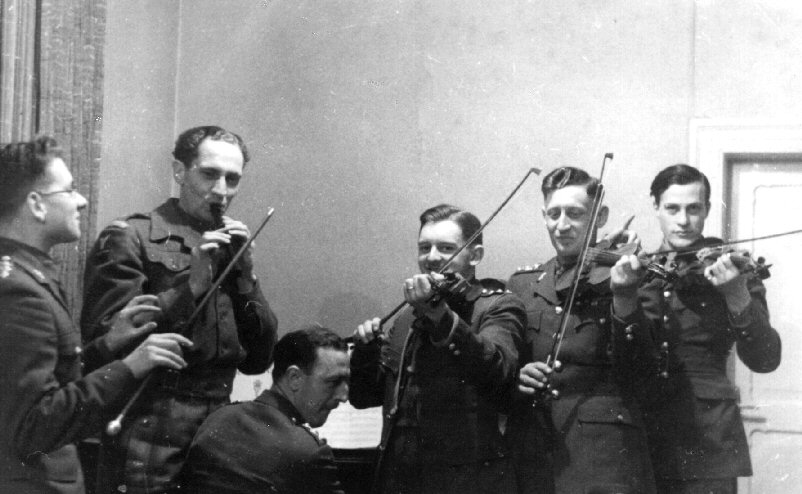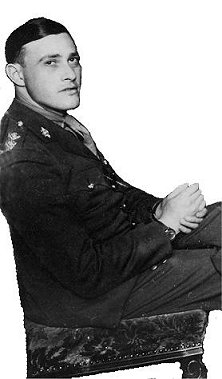Wounded in Action (N.W. Europe 1944-45) - 1st Battalion Worcestershire Regiment
Lieut. Freddie Henry (276393)
(12 Platoon, ‘B’ Company)
Lieut. Freddie Henry |
Gilbert Frederick Powlett Henry, was commissioned in to the Royal Fusilier Regiment on the 15th May 1943. Early in 1944 he was posted to the 1st Battalion Worcestershire Regiment as Platoon Commander in ‘B’ Company. Know by his men and fellow officers as “Freddie” he soon made a impression on his men and he referred to them as “The Cream”! He landed in Normandy with the 1st Battalion in June 1944 and was soon in action. After the breakout in Normandy the 1st Battalion took part in the various actions which resulted in the capture of Mt. Pinçon. After its capture the 5th Battalion D.C.L.I. took Le Plessis Grimoult in a classic action but the southern foothills of the 'mountain' remained in German hands and heavily defended. It was necessary for this area to be cleared to provide a start line for further Corps operations and the 1st Battalion was given that task. What had to be cleared was in fact a pocket between La Varinière and La Plessis Grimoult and an objective of a substantial farm buildings complex was specified. The ground to be 'swept' was bounded on the left by a road which was believed to be occupied by machine gun pockets and on the right by a thick wood which was known to be heavily occupied. Parallel with the road and some 25 yards from it there was a thick hedgerow and parallel with the wood and some 50 yards from it there was a further hedgerow on a shallow bank approximately 18" high. The road, the wood and the hedgerows led right up to the objective and the distance between the two hedgerows was some 100 yards. The distance between La Varinière and the objective was approximately 1000 yards and between the hedgerows and running perpendicular to them there was a series of some further three hedgerows running, as it were, horizontally across the front. Attempts at clearing the ground had been made by attacking the wood on the right but such had proved unsuccessful and upon being given the task the Company Commander of Freddie's Company (Major A. A. Grubb – ‘B’ Company) decided to adopt the somewhat complicated plan of walking down through the middle between the two hedgerows! |
The exercise must have been considered of some importance as the Company Commander received his orders at first light from the Divisional Commander personally at a point which in fact was the end of the sunken track which had been discovered by a Troop of the 13/18 Hussars and which had given access to the top of Mt. Pinçon. He was given the support of the Divisional Artillery (72-25 lb guns) 2 Medium Regiments Royal Artillery and 1 Heavy Regiment Royal Artillery together with the 4.2" Mortars of the Division and a Squadron of the 4/7 Royal Dragoon Guards!
Not unreasonable support for a Company of about 86 men which was its strength at that time in spite of reinforcement only the day before. This was all the Battalion Commander could spare. The total fire power was given for a full half hour and the plan was that such should be directed entirely at the objective and that the flanks should be protected by the tanks.
The start line selected by the Company Commander was one of the horizontal hedges and at the precise moment when this was about to be crossed, it was shelled very heavily. The operation was postponed for 15 minutes accordingly and indeed a further 15 minutes of the total gun fire was granted by Division.
The 86 men of the Company were not sufficient to constitute 3 Platoons and accordingly they were split into 2 Platoons with a somewhat stronger Company Headquarters than normal. Apart from Freddie the Company Commander only had one other Officer who in fact had just been posted to him as Second-in-Command and he considered it unfair to ask this officer to command a Platoon at such short notice. The two Platoons were commanded accordingly by Freddie and a Sergeant who had been Freddie's Platoon Sergeant up until that time. He was a very experienced and first rate regular soldier.
The Company Commander had no alternative but to direct that Freddie's Platoon should lead and when this was put to him Freddie enquired if in fact there was not somebody else who might lead on this occasion. This came as a great surprise to the Company Commander as Freddie had been 'in the thick of it' throughout and had never given any indication of the slightest reluctance to take on the most dangerous tasks. Such surprise was expressed and Freddie was asked the reason he had said what he had. His answer was interesting. He was then 20 years of age and he indicated that his 21st Birthday was due within a very short time. If he survived until the age of 21 his family line would inherit substantially from a large family trust; if he did not so survive, the trust estate would pass down the line of another member of the family with whom Freddie was not too friendly (Freddie's actual birth date was 8th September). Such can be the vagaries of the law in the hands of short-sighted or inadequately advised settlers. The Company Commander could not help but be impressed and concerned and he suggested that the only alternative was that he should take Freddie's Platoon and that Freddie might command the Company. Freddie realised, as did everybody else, that what was asked of the Company was an unenviable task. The recollection is that Freddie was 'insulted' by this suggestion and when the time came he set off with his Platoon smoking a cigarette in an ivory cigarette holder and wearing a beret with the Regimental Star in it as opposed to his steel helmet. Apart from two or three stalwarts, he was the only member of his Platoon to reach the objective but he was hit no less than five times. |
Major "Algy" Grubb |
In his own words which he wrote subsequently, Freddie recalls: “I was first hit on the inside of my right leg. I investigated hastily to see if I had lost anything that mattered but all was well for the bullet had only grazed the inside of my leg to pass on its way. A few yards further on a chunk of wood flew off my rifle just in front of the carrying hand. My depleted Platoon and myself reached the objective and a German machine gun crew surrendered to me. I stepped forward to grab the machine gun to use myself when I received a tremendous blow in my right side which spun me round in the best Hollywood tradition. I took a couple of paces and collapsed to the ground. I had been shot in the right shoulder but at the same time I had received an explosive bullet in my right chest which produced a massive wound and a fair size hole into my lung. Even then I wasn't finished with all the excitement. As I was lying on my left side, a bullet, obviously fired from miles away, came gently wafting down to earth to hit me in my right elbow. It was so 'spent' that I was able to squeeze it out like a thorn! All the men who were with me were killed. For a while I thought I might 'kick the bucket' but then I thought of the relation, whom I did not care for too much, who would inherit my money if I died. Then of all strange places to think of at such a time, I thought of The Berkeley Hotel and Buttery and of all the fun I had had there. I decided then and there that I had no intention of dying and immediately started to do deep breathing exercises!”
Freddie was believed to be dead but he was in fact recovered by a Troop Commander of the 4/7 Royal Dragoon Guards who carried him on the back of his tank to safety. From a Field Hospital outside Bayeux he was flown back to England and The Queen Elizabeth Hospital, Birmingham.
The date was Wednesday 9th August 1944!
For his gallantry in this action Freddie received special recognition with a mention in despatches (London Gazette 10th May 1945). Although he was awarded this award while serving with the Worcestershire Regiment it was listed in the London Gazette under the Royal Fusilier Regiment, the one he received his commission for.
After recovering from his wounds Freddie returned back to the 1st Battalion in Germany at the beginning of 1946 as Pioneer Officer in Support Company. A year later, with the rank of Captain, Freddie returned to civvy life back in England.

L to R: Capt. Benny Goodman, Capt. J. D. O’Shea, Capt. Ronny Whatley,
Capt. Percy Huxter, Capt. John Reynolds and Capt. Freddie Henry. (Goslar, Germany 1946)
Freddie Henry died on Tuesday the 10th August 1982 in sad circumstances. He entered hospital for a routine operation but during the course of the treatment other conditions were found to be present and he did not survive. It must be beyond a doubt that his death at the relatively young age of 58 years was contributed to by wounds which he suffered during the campaign in Normandy.


